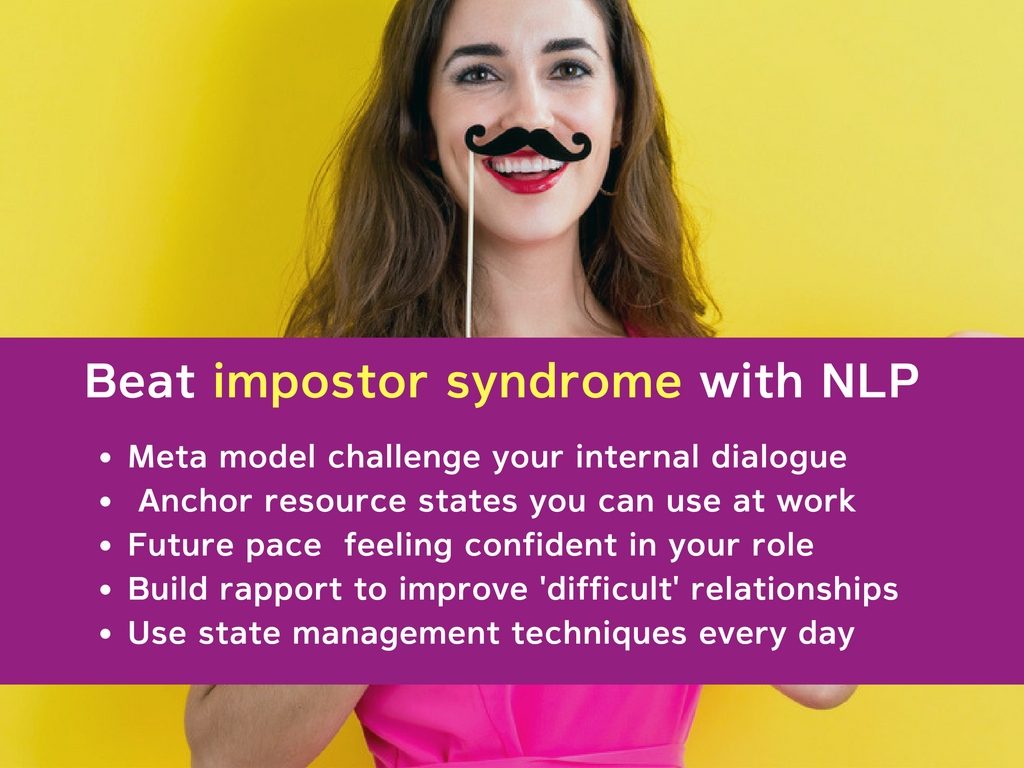Do you secretly fear you’re not up to doing your job? If you experience these feelings frequently, there’s a good chance you might be suffering from ‘imposter syndrome’. This is a strong and pervasive fear that you don’t really have what it takes to succeed.
 So, if you think that you’re suffering from imposter syndrome, what can you do? Here are five ways you can use NLP to boost your confidence and stop imposter syndrome in its tracks.
So, if you think that you’re suffering from imposter syndrome, what can you do? Here are five ways you can use NLP to boost your confidence and stop imposter syndrome in its tracks.
Meta model challenge your internal dialogue
The meta model is a linguistic toolkit for challenging limiting language. People who suffer from imposter syndrome tend to have highly critical self-talk. You can use meta model questions to challenge this type of self-talk and shift to more constructive inner dialogue. To do this reword definitive language like, ‘I don’t know how to do this’ with alternative statements like ‘I can find out how to do this’. Also work to banish perfectionist self-talk. Instead of saying, ‘I will work back and finish it properly’ say to yourself, ‘I will finish it as well as I can, given the time constraints I’m under’. Listen to my free podcast Beat Imposter Syndrome with NLP for more advice on practical tips.
The meta model is an exceptional tool for helping you shift and reframe negative internal dialogue. To find out more about using the meta model enrol in my course, Creating Success with NLP.
Anchor resource states you can use at work
Anchoring is a process for connecting a stimulus to a response. For example, you could anchor a state of being confident and relaxed to a pattern of taking three deep breaths. To create an anchor, first decide on the stimulus you will use. This could be something like a movement or visualising a specific image in your mind’s eye. Next, think of the state that you want to elicit. For example, you might want to feel relaxed and comfortable standing in front of an audience. Now remember back to a time when you experienced that state naturally. Imagine it in full, graphic detail remembering what you could see, hear and feel in the situation. As the state peaks, fire your anchor. Repeat this process three or more times to establish a strong neurological connection between the anchor and the state that you desire.
Like this blog post? Subscribe for weekly tips SUBSCRIBE
Future pace feeling confident in your role
Take five minutes in the morning to close your eyes and do a quick mental rehearsal of how your day will pan out. Mentally create pictures, sounds and feelings to represent your ideal day. Do this three or more times and you’ll find that you’ve created a mindset that will take you through the day feeling confident.
Build rapport to improve difficult relationships
Many people with imposter syndrome feel that others don’t like them. You can prevent this mindset from holding you back at work by consciously and deliberately building positive relationships. For example, actively seek out points you have in common with other people. Make sure that you talk about these. Or try subtly mirroring and matching body language patterns when you’re in conversation. The more that you do this, the easier you will find it to connect with, and feel comfortable around others. Learn more in my free podcast Beat Imposter Syndrome with NLP.
Rapport is considered to be one of the main pillars of NLP, so it’s certainly worth taking time to master rapport building skills in order to boost your confidence.
Use state management techniques every day
Remember that confidence is a state of mind. This makes NLP state management tools ideal for building your confidence. I teach a range of state management tools in my course, Building Success with NLP.
Keep in mind that state management is something you need to do actively. Don’t wait for a good mood to descend. Take a moment to activate it using NLP. If you’d like to find out more about how to feel successful and confident using NLP techniques, enrol in my workshop Creating Success with NLP. I would love to work with you there.
Like this blog post? Subscribe for weekly tips SUBSCRIBE
About the author of these tips
Eleanor Shakiba has dedicated her career to helping women break through glass ceilings. She is a well-known trainer and coach, who has helped more than 50,000 women build confidence, presence and influence at work. Eleanor is a lifelong learner and holds qualifications in Social Anthropology, Applied Psychology, Adult Education and Neuro Linguistic Programming.